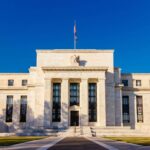Paul Dietrich, chief investment strategist at Briley Wealth, has sounded the alarm, predicting a potential “severe recession” for the US in early 2024. Citing an array of recessionary signals, including an explosive stock market rally and weakening job market indicators, Dietrich warns that the economy might be on the brink of a significant downturn. This article explores the key factors contributing to Dietrich’s recession forecast.
Recession Signals and Stock Market Rally: Dietrich emphasizes the remarkable gains witnessed in the S&P 500 throughout the year, particularly noting its best month in November. The surge in the benchmark index has been fueled by expectations of early-year interest rate cuts by the Federal Reserve. However, Dietrich cautions that rate cuts are typically a response to a slowing economy and rising unemployment, signifying a recession.

Stock Market Disconnects and Labor Market Weakness: Highlighting what Dietrich calls “stock market disconnects,” the article points to discrepancies in market performance. While the S&P 500 shows overall gains, the S&P 500 equal-weighted index, representing the average stock, has entered “correction territory,” indicating potential fragility in the broader market. The labor market also raises concerns, with declining job openings and rising continuing claims for unemployment benefits.
Recessionary Levels and Historical Context: Dietrich draws attention to indicators suggesting a weakening labor market, such as a rise in continuing unemployment claims to levels he deems “recessionary.” Despite an overall decrease in the unemployment rate in November, these warning signs align with historical precedents, particularly instances preceding the 2001, 2008, and 2020 recessions, where stock markets rallied before economic contractions.
Investor Sentiment and Contrarian Views: The article contrasts Dietrich’s recession outlook with prevailing sentiments in the financial markets. While some investors anticipate a continuation of the bull market, Dietrich remains skeptical, stating, “To think that after a 13-year bull market, we will not see a normal cyclical bear market recession is to believe that the business cycle has been miraculously repealed.”
Market Expectations and Differing Predictions: Despite Dietrich’s warnings, the broader financial landscape anticipates a softer landing, with Wall Street strategists predicting positive stock market performance in 2024. The New York Fed, for instance, has revised its 12-month recession prediction down to 51%, challenging the prevailing pessimism.
Conclusion: As contrasting views shape the economic narrative, investors face a critical juncture marked by potential recession risks. Dietrich’s cautionary outlook serves as a reminder of the delicate balance between optimism and the underlying warning signals that may influence the trajectory of the US economy in early 2024.









